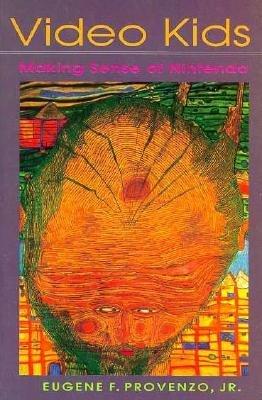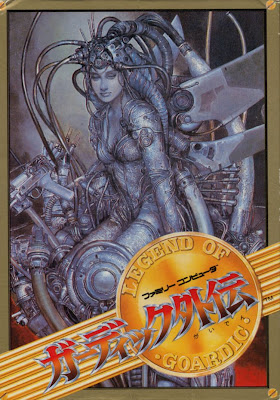
Video Game Book Reviews
Wow, where to begin with Video Kids? Provenzo's book is not the first to examine the topic of how video games affect children, but it's one of the earliest to treat them seriously, as significant cultural creations. Unfortunately it's also so infuriatingly misguided. In fairness Provenzo makes a lot of good points, and some sections which meticulously dissect games (such as Super Mario Bros 2) are genuinely enthralling, but overall the ratio of bullshit to intelligent analysis runs at 10-to-1.
The starting chapter, discussing Nintendo's monopoly in the market, makes some valid criticisms. He points out the deplorable practices of Nintendo like few others would. He then goes on to criticise the company's wish to enter the telecommunications business. It seems reasonable, but by the book's halfway mark one starts to wonder if some of his criticisms aren't just thinly veiled anti-Japanese sentiment, as was popular at the time. He spends time highlighting points put forth by Dan Gutman (at least a third of the book is actually Provenzo referencing someone else), who criticises Pac-Man, Donkey Kong and Space Invaders for being too restrictive. Whereas games like Asteroids, Defender and Robotron allow noteworthy player freedom. Notice how the first group is Japanese versus the second which is American and European, with Provenzo utterly failing to comprehend the allure of games, despite spending a chapter discussing the topic. The less said about his reliance on referencing the nonsensical ramblings of psychoanalytical academics the better - it's all sex and oral sadism according to them.
Unfortunately things gets progressively worse. A lot of analysis is made of what children actually say, which Provenzo quotes directly. Right away it's clear why you shouldn't trust kids, seeing as their warped descriptions of gameplay events are not only incorrect, but are colouring the judgement of the researcher. It's not just the kids, though, but Provenzo himself. There's a dozen or more factual mistakes regarding in-game details. To give one example, he seems to have convinced himself that RoboCop was one of the top 10 NES games by 1990. Was it really? He openly states his source for such information is developers, programmers and retailers, and then he proceeds to reference RoboCop fifteen times in the book, more than any other game according to the Index (though SMB2 is examined more intensely). Is RoboCop - a movie license to begin with - really the defining game for the NES in America?
Perhaps the biggest offence in the early section of the book is the role Provenzo regards video games as having. He states that unlike textbooks or children's books, which must pass library approval boards, videogame content is dictated by the consumer. This is precisely how it should be! The ironic thing is, while this was true of the computer scene in the US which had total freedom, the home console scene, specifically that of Nintendo, was nowhere near as unrestricted as Provenzo likes to believe. Nintendo had strict internal content policies, similar in style to the Hays Code for films, which crippled the content developers could produce. All the supposed sexism, racism, xenophobia and violence which Provenzo claims the games contain, simply don't exist outside of his mind - certainly not to the degree he claims. Throughout the book he also fails to take into account the cultural origin of the games (usually Japan), and the intentions of the original creators. He claims videogames encourage selfish behaviour and solitary play even with two players, conveniently failing to mention the cooperative two-player games that exist in his charts, such as Contra and Bubble Bobble. It's worth pointing out that we now know Bubble Bobble's creator made it specifically for two-players, so that guys could play with their girlfriends in arcades, thereby encouraging women to take part. Provenzo also criticises games for not featuring scenarios with group co-operation, despite the existence of RPGs with multiple character parties and games like Maniac Mansion.
Chapter 5 examines the portrayal of women, and this theme overshadows the entire book. For starters Provenzo is obsessively pre-occupied with gender bias, to the point that all pronouns for third parties become feminised, creating a perverse writing style - ie: "a child is limited only by her imagination." It gets worse when he proceeds painstakingly to build an argument of rampant sexism using sloppy research. He states that game covers are a good representation of a game's content, and proceeds then to judge the degree of sexism in games based on said covers. Which is a fallacy, because covers are often drawn by external artists, and as shown by the Cultural Anxiety website, covers for the US market were often altered from their original versions, which not only changed the intent of the developers, but in some cases they had absolutely nothing to do with the content of the game!
Provenzo goes to great lengths criticising the cover of Double Dragon II (which in fairness uses the same image internationally, only with the remains of Marian's skirt lengthened in the West), because Marian is portrayed as submissive. He also acknowledges the whip wielding woman, commenting on her breast size. Next he draws up a table of 47 game covers, counting the number of males and females, and categorising them into submissive or dominant roles. He says a dominant role is, as one example, someone wielding a weapon. To highlight the endemic faultiness of his research, he then fails to count the whip-wielding woman for the Double Dragon II cover, wrongly counting only a single woman (Marian), and worse still, he fails to acknowledge the whip-wielder as dominant. More mistakes are made with Ultima, Legacy of the Wizard and several others. After the table of 47 games Provenzo proudly proclaims that not a single female was shown in a dominant position, thereby proving that videogames represent a serious threat to the mental health of the nation's children. This, despite the fact that if you follow the criteria he himself sets out, there are several dominant women on the covers listed.
It may seem trivial to dwell on these mistakes with the data, but it's upon these numbers that he fights much of his incorrect arguments. He then criticises games because there aren't ever any women rescuing men - as if this scenario was the norm in other media, and as if videogames are somehow an aberration which defies societal norms. Never once does he acknowledge the fact that since the Greeks started writing their myths millennia ago, heroic men such as Orpheus rescuing women is the accepted traditional scenario. Videogames aren't sexist, they merely reflect thousands of years of human culture.
Furthermore, Provenzo entirely ignores games such as Metroid, Phantasy Star and Guardian Legend, to name but three with strong female protagonists. Metroid's omission is forgivable given that Samus isn't revealed until the end, and while Provenzo acknowledges Sega games he states clearly that the book is about the market leader, Nintendo. There's no excuse for Guardian Legend though, given that he mentions it three times in the book, never once commenting positively on its female lead (which is featured on the cover in varying forms for all regions except the US).
For anyone of any intellect, who visits HG101 and has an understanding of game history, it's quite clear that Provenzo has selectively picked and manipulated results, in order to facilitate his own warped agenda. Which is a terrible shame, because as stated there are the occasional nuggets of genuine insight, and he certainly did plenty of legwork when writing the book, even if the research itself was faulty. With 20 years hindsight it's easy to point out the serious flaws and fallacies put forth in Video Kids, some of which could be quite detrimental if taken seriously.


